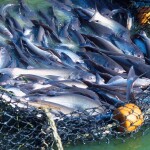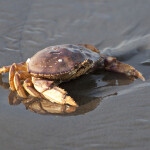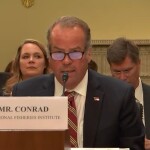Conservation groups are suing the city of Tacoma, Washington, U.S.A., alleging the municipality’s wastewater discharge is poisoning Chinook salmon in the Puget Sound.
“Despite scientists’ years of having demonstrated harm to Puget Sound Chinook from Tacoma’s discharge of personal care products, synthetic hormones, and industrial chemicals, [the Environmental Protection Agency] and the Department of Ecology have done absolutely nothing to prevent it,” Northwest Environmental Advocates Executive Director Nina Bell said in a statement. “We’re stepping up to stop Tacoma’s pollution because the regulatory agencies have long stepped away from doing their jobs.”
According to Northwest Environmental Advocates and the Center for Biological Diversity (CBD), contaminants are entering Puget Sound through Tacoma’s treated wastewater, leading to decreased growth and reproductive problems in Chinook salmon. The groups claim studies show Tacoma’s wastewater reduces Chinook survival rates by nearly half, and fish exposed to the contaminants present in the treated sewage act as if they’re starving.
“As a result of this [contaminants of emerging concern] poisoning, these salmon cannot breed or reproduce, grow, eat, fight off disease, maintain proper balance and function in their bodies and brains, compete for limited resources, or survive as well as they otherwise would,” the groups said in a notice to Tacoma officials. “In other words, discharges of CECs by the facility cause actual injury and death to ESA-listed Puget Sound Chinook salmon.”
On 8 April, the two conservation groups announced their intention to sue the city, arguing that the alleged poisoning is equivalent to illegal “take” of Chinook in violation of the Endangered Species Act. The lawsuit will also charge the city’s wastewater treatment plant with violating its stormwater permit issued under the Clean Water Act.
“It’s extremely unfortunate that on a daily basis Tacoma has fouled waterways and harmed protected salmon with toxic wastewater,” CBD Environmental Health Director Lori Ann Burd said in a statement. “We’re determined to do what it takes to make sure the city stops discharging toxic contaminants into the Sound so that people, salmon and orcas can thrive.”
The city has 60 days to respond to the group’s notice before they file a lawsuit.
“We are aware of the notice of intent to file a claim,” city spokesperson Maria Lee told The Tacoma News Tribune. “Given the potential for litigation, we are not able to comment further at this time.”
CBD is also one of the conservation groups – alongside Native Fish Society and Umpqua Watersheds – seeking Endangered Species Act (ESA) protections for spring-run Chinook salmon in the Pacific Northwest. The groups claim that spring-run Chinook are biologically distinct from their fall-run cousins, which are more abundant.
"Umpqua Watersheds has been tracking this population for decades and has never seen the wild spring Chinook population even close to its designated viability number for survival,” Stanley Petrowski, a member of Umpqua Watersheds, said in a statement. “The science is clear. This unique, ecologically significant species is going extinct."
The groups initially filed a petition with NOAA Fisheries in 2022, expanding the petition in 2023. But despite acknowledging that ESA protections may be warranted in 2023, NOAA Fisheries has yet to make a determination on the petition. In February 2025, the groups sued the federal government, claiming NOAA Fisheries had long missed its deadline to respond to their petition. NOAA Fisheries was also sued by the Wild Fish Conservancy earlier this year after missing the deadline to respond to their petition to have Alaska Chinook salmon listed under the ESA.
“The public should not have to take legal action to compel federal agencies to follow the law, but the dire crisis facing Alaska’s Chinook populations leaves us no other choice,” Helverson said. “These aren’t arbitrary timelines or bureaucratic red tape, they are essential safeguards to prevent extinction. NOAA isn’t just missing a deadline; it’s pushing Alaskan Chinook closer to extinction and starving the ecosystems and communities that rely on them.”







